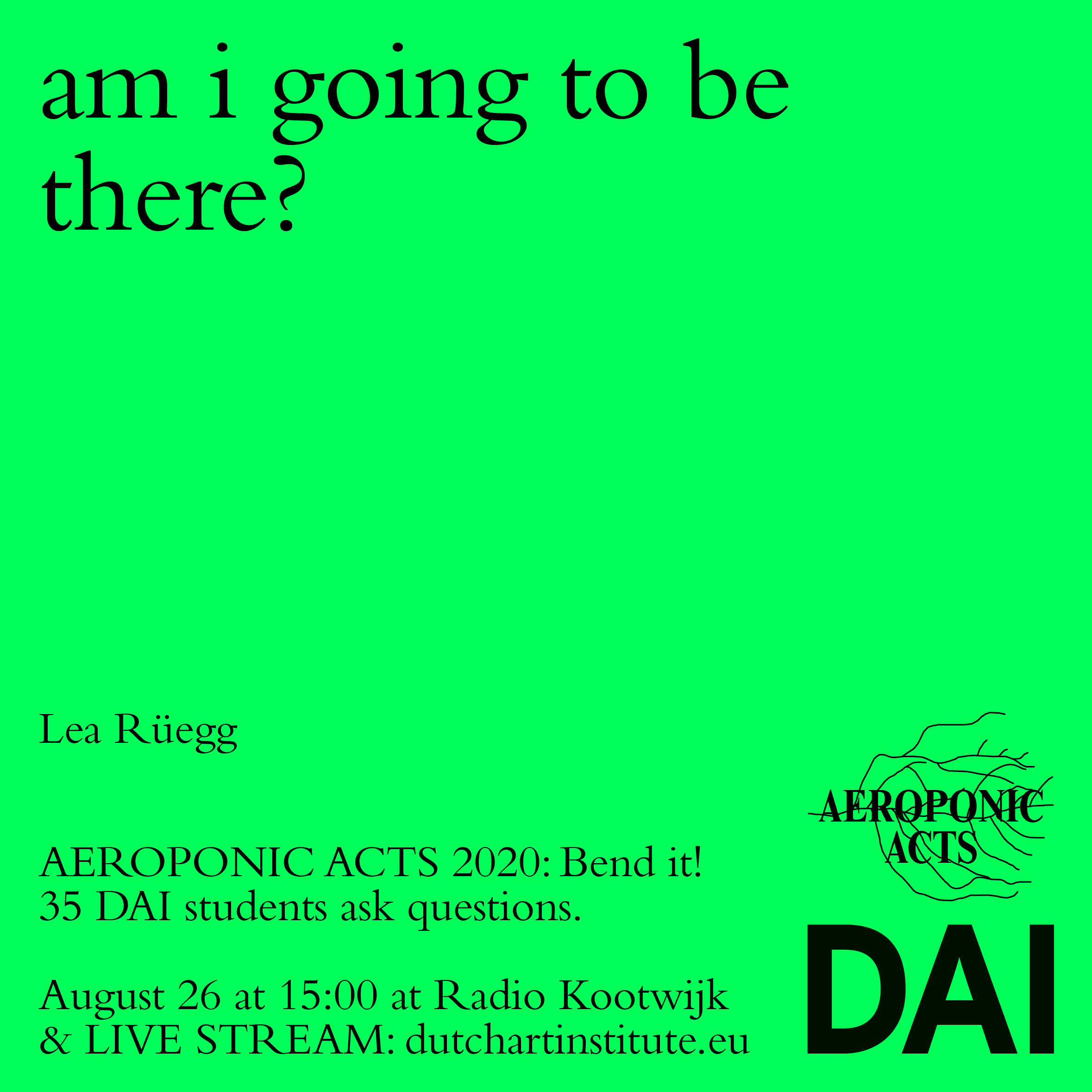Lea Rüegg: am i going to be there?
‘Aeroponic’ – root systems nourished by air – Acts is the name given to the nomadic Dutch Art Institute’s final Kitchen presentations. Each participant addresses one question.
Here you will find the documentation of Lea Rüegg's presentation as filmed by Baha Görkem Yalım. The written report is by Bethany Crawford and it includes a summary of the comments by esteemed guest respondents.
am i going to be there?
Lea's question:am i going to be there?
Bethany's report: Lea Rüegg’s multimedia performance begins with a sound piece that gains resonance as the performer introduces key themes through spoken word and song, questioning notions of presence/absence, (in)accesibilities and intimacies during Covid-19 that intensify already present conditions, repeating in different tones: ‘I don’t want to go there.’ The ‘there’ takes on multiple dimensions over the course of the presentation, contextualized within Radio Kootwijk and the Netherlands, so that Ruegg’s reflection on her return home to Switzerland as an exclusionary ‘postcard perfect’ landscape renders the trans-temporal ‘there’ of being in multiple places simultaneously. It ends with a live recording on her laptop of a dance in which the artist removes her clothes, mostly turned away from the on-site audience with her gaze fixed in the laptop, challenging who, when and where is significant, and ideas of intimacy and belonging amid a fractured present.
With Covid-19, Ana Teixeira Pinto brought up how everyone went through the stages of mourning – anger, grief, denial – and she wondered how Douglas Crimp’s writing on cultural representation and the AIDS crisis could inform how we will understand the pandemic through artistic responses. In the presentation, how super-structural violence is implicated in every facet of what is rendered and visible was clear, and she was interested in how the artist dealt with intimacy and privacy, noting that the current crisis made the collapse of the privileged space of interiority visible.
Amal Alhaag thanked Ruegg for connecting the piece with real life and showing the emotional rollercoaster of the current situation. The work made her question what is ‘there’, and its place in the time capsule of one’s imagination when it is left; when you return you don’t fit in it anymore, it no longer belongs to you. The work evoked memories for her of working in Zurich and what a strange reality one steps into, reminiscent of life in the Netherlands and the similarities to how we are conditioned and obsess over the norm and efficiency, which then renders us agents of the state in some way policing each other. She asked how we abolish that, if we want to go there, wherever there might be. Alhaag highlighted that in this context the question of colonialism, in touching on neutrality and the denial of accountability, refers to how the conditions of living in Covid-19 are a permanent state of living for some people in the world, reminding her of how unprepared and inflexible our reality in the West is, how it can’t factor in the unknown – that which we don’t know – as it is not part of our collective history. She said coming from a place where the unknown is an everyday practice in Somalia, this society reminded her what it is to be living in a state of emergency every day. She pointed out how the Dutch or Swiss state of emergency is still luxurious. ‘How do we deal with the unknown – how to not be unprepared for the unknown? What does it mean that the West has officially joined the rest of the world in not knowing what tomorrow will look like?’ She said she is still thinking about whether she will go there, and thanked Ruegg for the open-ended question.
To be where or to go where made Adam Szymczyk think about the utility of ‘where’ in the Negev desert during the British mandate of Palestine, and how within this context it was used to organize and resettle the Bedouin people. ‘To go there’ naturalized into the local language as ‘gotter’, became a stain on the language – the Bedouin people’s relocation to unofficial villages that don’t feature on maps, the forced order or dislocation, being made to go there because of religion or ethnicity, meant going ‘there’ gained political significance. The performance began with self-shaming for being here or present, which interested Szymczyk who reflected on ‘nostalgia’ as ‘homesickness’, a term invented by Swiss mercenaries while fighting in France, noting international residencies allow one to remain within the love of a home country without having to make a commitment to stay in the host country.
Lea Rüegg's am i going to be there? was presented at Radio Kootwijk.
Find the overview of all 35 AEROPONIC ACTS 2020 here: BEND IT!
About Lea Rüegg

